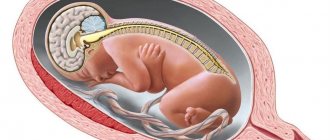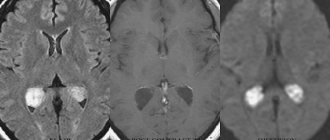Stress, urgent matters, the need to constantly be in touch, the nightlife of a big city - all these are modern realities and at the same time risk factors for the health of the human nervous system.
Once upon a time, our rhythm of life was completely tied to the annual and daily cycles, to the rising and setting of the sun, and when darkness fell, a person had no choice but to go to bed. Today society has the opportunity to function according to its own laws, ignoring and disrupting natural rhythms. However, no one has canceled our own internal biological rhythms. This leads to many problems. In first place is autonomic dysfunction of the nervous system and all accompanying symptoms, including insomnia as a result of disturbances in sleep and rest patterns.
The effect of lack of sleep on the functioning of the nervous system
Depriving the body of sleep at night and, especially, lack of sleep for more than a day distorts the normal physiological rhythms of the body, affecting the functioning of the nervous structures. As a result, the body's vulnerability threshold drops. And with a decrease in adaptive and reserve capabilities, the body becomes more sensitive to stress: a person endures physical and psycho-emotional stress with difficulty and emotion. With a seemingly ordinary load - at work, school, in the gym - a sudden feeling of fatigue and exhaustion suddenly arises, pain and discomfort in organ systems, characteristic of autonomic dysfunction, begin to bother.
The problem may not make itself known immediately, but gradually. We often ignore mild ailments without giving ourselves rest to recuperate. If you abuse the wrong regimen, tension in the nervous system can accumulate and result in serious autonomic dysfunction and regular crises. Uncontrolled sleep disturbance - now as a consequence - will be an important signal about problems with the health of the nervous system. In this case, even having the opportunity and desire, a person is no longer able to fall asleep peacefully, sleep soundly and feel healthy and rested in the morning.
The risk group includes professions associated with daily shifts, with frequent business trips/flights/changes of time zones, as well as students during the session and people who are “convenient” to work at night: freelancers, programmers, copywriters, people who work a lot at home at computer.
Preparing to do breathing exercises
At first glance, using breathing techniques is very simple, but in fact some preparation is required. To begin, try concentrating on your own breathing and observing it. As soon as you think about the rhythm and depth of your breathing, you will immediately feel that it is changing.
In such a situation, the speed of inhalation and exhalation slows down, and the normal rhythm evens out. Usually we use only the upper abdomen and the area near the lower ribs when breathing. But breathing practices involve opening the whole body. To start:
- Choose a comfortable position (sitting or lying down).
- Place your hands so that your fingertips are in your lower abdomen.
- Try directing a few breaths there, expanding the abdominal area.
- Gradually increase the depth of inhalation.
- Relax your throat completely.
- Try to direct your breath to your spine, feel how the back of your torso fills with air and “deflates” as you exhale.
Even 5 minutes of such breathing helps cope with stress. To achieve a more noticeable effect, you should master and regularly perform special exercises.
Getting acquainted with breathing techniques should start with the simplest exercises. For example, immediately after waking up, sit up in bed and close your eyes. With your mouth open, take 3 loud breaths in and out, trying to feel the contraction of your abdominal muscles. Imagine that you are breathing on a mirror so that it fogs up. Inhale and exhale through your nose for a few more minutes.
Pay attention to how you breathe while concentrating, when you are very nervous. At such moments, breathing becomes intermittent and shallow. To cope with stress, inhale through your nose, hold your breath for a few moments, and exhale.
Insomnia as a consequence of nervous tension
Frequent complaints about sleep disturbances in autonomic dysfunction (AD): difficulty falling asleep at night, interrupted sleep with frequent awakenings, difficulty falling asleep after waking up at night, early awakening in the morning, feeling tired and tired in the morning. As a result, a person feels depressed and overwhelmed throughout the day, and other symptoms of VD are added: chronic fatigue syndrome, unstable blood pressure, headaches, anxiety and fatigue. The patient may associate his condition with regular “lack of sleep,” but the problem is much deeper.
Such complaints are usually the first to signal to us that the autonomic nervous system needs treatment. They arise long (on average six months or a year) before the manifestation of other somatic problems with vegetation.
Sleep altered under the influence of stress worsens a person’s quality of life. Thus, a vicious circle can form: stress leads to insomnia, and insomnia creates new stress for the body. In conditions of lack of sleep, the body is unable to recover. In this way, tension in the work of the autonomic nervous system is formed and aggravated, which provokes new problems with sleep and health.
Read in the article:
- Stress: causes, symptoms and consequences
- How to cope with stress?
- The essence and principles of breathing exercises
- Why do breathing exercises help relieve stress?
- Preparing to do breathing exercises
- Effective breathing techniques
- Additional benefits of breathing exercises
Breathing exercises can significantly improve the condition of the body. It is believed that breathing helps unite the body and mind, relax, relieve anxiety and stress, cope with insomnia and solve a number of other problems.
Causes of sleep problems
The range of reasons that cause sleep problems is, at first glance, wide. But what they all have in common is that this is stress, a problem that is not just psychological, but deeply physiological.
“Once I experienced a lot of stress - I mixed up the time and was late for the plane with two children in my arms. The situation is a thing of the past. But the panic that gripped me then has not left me to this day. It’s rare to fall asleep before 4-5 am, even if you go to bed long before that time. It happens that at 6 o’clock I wake up in a cold sweat, my heart is pounding furiously” - KCVN patient, Nadezhda.
Processes in the body as a whole are divided into two phases. The first phase is regulated by the sympathetic division of the autonomic nervous system. This is mobilization and activation: react! hit! run! etc. The second is the relaxation phase, when the activity of the sympathetic department is replaced by the parasympathetic and sets up the orgasm for rest and replenishment of reserves. When transitioning from one state to another, all processes in the body are rearranged: pulse, blood circulation, blood pressure, hormone production, etc. change.
When a person finds himself in stressful conditions, the nervous system can malfunction. The harmonious work of the sympathetic and parasympathetic departments is disrupted. As a result, the body suddenly mobilizes at night, and during the day, after a night of overexertion, it is no longer able to work actively.
“Before going to bed, I constantly had an anxious feeling, and I couldn’t sleep for a long time. During the night I woke up several times with the same feeling of anxiety. It happened that I woke up all wet from sweat and with a headache. And in the morning I had a stomach ache, chills, nausea, vomiting... This could last up to half an hour, but no more. And then during the day my psychological state was very bad: I was suspicious, sensitive, I constantly wanted to cry” - KCVN patient, Olesya.
This pathology is very clearly reflected by the study of heart rate variability. From the slightest load (the patient is asked to stand on his feet from a lying position), the pulse increases by more than 40 beats per minute, instead of the prescribed 20. After the load, the person lies down again, but his pulse does not calm down, and even intensifies, therefore there is no timely restructuring between the sympathetic and parasympathetic divisions.
In addition, with an artificial lack of sleep (night shifts, etc.), a deficiency in phase changes and insufficient inclusion of the rest phase occurs. This leads to insufficient replenishment of the body's reserves and insufficient recovery after daily activity. Hypersympathicotonia is formed, which leads to somatic complaints, fatigue syndrome, and a decrease in the effective response to stress even under minor loads.
Effective breathing techniques
There are many stress-relieving exercises based on breathing techniques. You can try different methods and choose those that best affect your emotional state and give the most tangible effect:
- Diaphragmatic breathing
- Lying on your back, place your palms on your stomach and take a deep breath through your nose. Concentrate on the breathing process and the anterior abdominal wall. Exhale long through your mouth, pressing your palms onto your stomach. - While sitting, lying on your back or standing, inhale for 3 counts, hold your breath for 1-2 seconds, exhale for 7 counts.
- Sitting on a chair, close one nostril with your thumb, inhale slowly through the other, pause for a second and exhale. Repeat the cycle with the other nostril.
- While lying down, place your hand on your stomach and inhale slowly through your nose, feeling the abdominal wall rise. Push the air out completely by contracting your abdominal muscles.
- Inhale and exhale through your nose as quickly as possible, keeping your mouth closed.
- Find a square-shaped object. Look at its upper left corner and inhale, then at the upper right corner - hold your breath. Look at the lower right corner and exhale, look at the lower left corner - relax and smile.
If signs of dizziness appear, you should stop exercising and take a break. If you do the exercises regularly, over time your dizziness will stop.
Treatment of insomnia and vegetative dystonia
Symptoms of autonomic dystonia cease to bother the patient after complete recovery of the nervous system, which can take from several months to several years, depending on the degree of the disorder. However, practice shows that sleep problems are the first to leave the patient, and already on the third day of treatment, patients notice significant improvements in the quality of sleep.
The most effective method of restoring healthy sleep is complex laser therapy. Today, this is a unique technology that allows you to absolutely safely launch the body’s self-healing processes, normalize well-being, restore a surge of strength, restore good sleep, normalize blood pressure, hormonal levels, psycho-emotional state and other processes in the body.
“Laser therapy immediately relaxed me - I felt comfortable and could even fall asleep. In the first days of treatment, a mood appeared. In the morning, my head seemed clearer, and many tasks at work ceased to be difficult” - Yuri, patient of the Central Clinical Hospital.
Even one session of laser therapy leads to positive changes. However, the full course requires daily regularity with a gradual increase in the power of laser light exposure. This is the only way to achieve high and long-term results from the therapy.
At KCVN we use intravenous laser blood irradiation ILBI and low-intensity laser therapy LILI. Other methods of physiotherapy are no less effective in treating sleep problems. An integrated approach allows you to quickly (within 10 days) start the processes of self-healing of the nervous system.
Progressive relaxation
Relaxing breathing is used not only as an independent element of calming gymnastics. There is something called progressive relaxation. It involves the gradual relaxation of all muscles, even those that are not involved in breathing. It is performed as follows: the hand is clenched into a fist, gradually unclenched until complete relaxation. Then the other hand. Next, attention turns to the legs. When all the muscles are relaxed, the person will feel great relief.
Ultimately, regular exercise will provide peace and tranquility for a long period of time. This can be done on an ongoing basis, daily, or as needed.
Prevention of insomnia and sleep problems
There is no better prevention than a regular sleep and wakefulness schedule in accordance with the rhythms of nature and the human body. What other tips can we give for good sleep and a healthy nervous system? Fairly standard:
- You should fall asleep before 23:00, because it is at this time that the nervous system is set to relax and the hormone melatonin is produced.
- Do not eat heavy food at night, do not drink caffeine-containing drinks.
- During the day, spend more time outdoors and walking.
- Sleep in a ventilated area, in the dark (or wear a special sleep mask).
- Leave things for the morning, don’t waste your night’s sleep on something more “useful” or urgent. Better get up early and do all the necessary things in the morning. One of the modern theories of brain function says that the most productive time of work is from 5 to 8 am!
- You should not rely on the weekend and sleep on these two days for the whole week. It’s better to choose a single optimal sleep and wakefulness routine and follow it daily.
- If your sleep pattern is off, you can restore it with soothing herbal teas with honey, relaxation practices, or directly taking melatonin for a certain period of time necessary to restore the pattern, after which the medication must be stopped. For more detailed instructions, be sure to consult a neurologist.
If such methods no longer help you fall asleep peacefully at night and feel alert during the day, then it is necessary to undergo an examination of the ANS and, if a disorder of the autonomic nervous system is detected, undergo a course of treatment to restore its normal functioning.
Why do breathing exercises help relieve stress?
Situations often arise in life that cause strong feelings and anxiety. This is just a stone's throw away from real stress, which becomes chronic over time. One of the simplest and most accessible ways to deal with stress is through special sets of breathing exercises.
Numerous studies have proven that breathing techniques really help relieve nervous tension, forget about insomnia and get rid of depression. With a conscious method of breathing, the heart rate slows down, which makes it possible to calm down and better control oneself, emotions and sensations.
Stress relief also occurs due to muscle relaxation, activation of the production of endorphins - “happiness hormones”, lowering blood pressure, and stimulating the functioning of the lymphatic system. Special exercises help restore your voice and recover from a cold.









